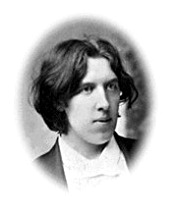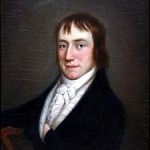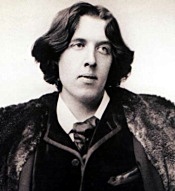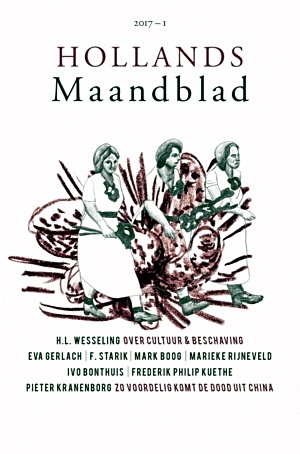Fleurs du Mal Magazine


Or see the index
 Oscar Wilde
Oscar Wilde
(1854 – 1900)
The Master
Now when the darkness came over the earth Joseph of Arimathea, having lighted a torch of pinewood, passed down from the hill into the valley. For he had business in his own home.
And kneeling on the flint stones of the Valley of Desolation he saw a young man who was naked and weeping. His hair was the colour of honey, and his body was as a white flower, but he had wounded his body with thorns and on his hair had he set ashes as a crown.
And he who had great possessions said to the young man who was naked and weeping, ‘I do not wonder that your sorrow is so great, for surely He was a just man.’
And the young man answered, ‘It is not for Him that I am weeping, but for myself. I too have changed water into wine, and I have healed the leper and given sight to the blind. I have walked upon the waters, and from the dwellers in the tombs I have cast out devils. I have fed the hungry in the desert where there was no food, and I have raised the dead from their narrow houses, and at my bidding, and before a great multitude of people, a barren fig-tree withered away. All things that this man has done I have done also. And yet they have not crucified me.
Oscar Wilde, 1894
fleursdumal.nl magazine
More in: Archive W-X, Wilde, Oscar, Wilde, Oscar

Oscar Wilde
Her Voice
The wild bee reels from bough to bough
With his furry coat and his gauzy wing,
Now in a lily-cup, and now
Setting a jacinth bell a-swing,
In his wandering;
Sit closer love: it was here I trow
I made that vow,
Swore that two lives should be like one
As long as the sea-gull loved the sea,
As long as the sunflower sought the sun,-
It shall be, I said, for eternity
‘Twixt you and me!
Dear friend, those times are over and done;
Love’s web is spun.
Look upward where the poplar trees
Sway and sway in the summer air,
Here in the valley never a breeze
Scatters the thistledown, but there
Great winds blow fair
From the mighty murmuring mystical seas,
And the wave-lashed leas.
Look upward where the white gull screams,
What does it see that we do not see?
Is that a star? or the lamp that gleams
On some outward voyaging argosy,
Ah! can it be
We have lived our lives in a land of dreams!
How sad it seems.
Sweet, there is nothing left to say
But this, that love is never lost,
Keen winter stabs the breasts of May
Whose crimson roses burst his frost,
Ships tempest-tossed
Will find a harbour in some bay,
And so we may.
And there is nothing left to do
But to kiss once again, and part,
Nay, there is nothing we should rue,
I have my beauty,-you your Art,
Nay, do not start,
One world was not enough for two
Like me and you.
Oscar Wilde (1854 – 1900)
Her Voice
fleursdumal.nl magazine
More in: Archive W-X, Wilde, Oscar, Wilde, Oscar

William Wordsworth
I wandered lonely as a cloud
I wandered lonely as a cloud
That floats on high o’er vales and hills,
When all at once I saw a crowd,
A host, of golden daffodils;
Beside the lake, beneath the trees,
Fluttering and dancing in the breeze.
Continuous as the stars that shine
And twinkle on the milky way,
They stretched in never-ending line
Along the margin of a bay:
Ten thousand saw I at a glance,
Tossing their heads in sprightly dance.
The waves beside them danced, but they
Out-did the sparkling leaves in glee;
A poet could not be but gay,
In such a jocund company!
I gazed—and gazed—but little thought
What wealth the show to me had brought:
For oft, when on my couch I lie
In vacant or in pensive mood,
They flash upon that inward eye
Which is the bliss of solitude;
And then my heart with pleasure fills,
And dances with the daffodils.
William Wordsworth (1770 – 1850)
I wandered lonely as a cloud
fleursdumal.nl magazine
More in: Archive W-X, Wordsworth, Wordsworth, William
 Oscar Wilde
Oscar Wilde
(1854 – 1900)
The Disciple
When Narcissus died the pool of his pleasure changed from a cup of sweet waters into a cup of salt tears, and the Oreads came weeping through the woodland that they might sing to the pool and give it comfort.
And when they saw that the pool had changed from a cup of sweet waters into a cup of salt tears, they loosened the green tresses of their hair and cried to the pool and said, ‘We do not wonder that you should mourn in this manner for Narcissus, so beautiful was he.’
‘But was Narcissus beautiful?’ said the pool.
‘Who should know that better than you?’ answered the Oreads. ‘Us did he ever pass by, but you he sought for, and would lie on your banks and look down at you, and in the mirror of your waters he would mirror his own beauty.’
And the pool answered, ‘But I loved Narcissus because, as he lay on my banks and looked down at me, in the mirror of his eyes I saw ever my own beauty mirrored.’
Oscar Wilde 1894
fleursdumal.nl magazine
More in: Archive W-X, Wilde, Oscar, Wilde, Oscar

William Wordsworth
London 1802
Milton! thou should’st be living at this hour:
England hath need of thee: she is a fen
Of stagnant waters: altar, sword, and pen,
Fireside, the heroic wealth of hall and bower,
Have forfeited their ancient English dower
Of inward happiness. We are selfish men;
Oh! raise us up, return to us again;
And give us manners, virtue, freedom, power.
Thy soul was like a Star, and dwelt apart:
Thou hadst a voice whose sound was like the sea:
Pure as the naked heavens, majestic, free,
So didst thou travel on life’s common way,
In cheerful godliness; and yet thy heart
The lowliest duties on herself did lay.
William Wordsworth (1770 – 1850)
Poem: London 1802
fleursdumal.nl magazine
More in: Archive W-X, Milton, John, Wordsworth, Wordsworth, William

Oscar Wilde
Amor Intellectualis
Oft have we trod the vales of Castaly
And heard sweet notes of sylvan music blown
From antique reeds to common folk unknown:
And often launched our bark upon that sea
Which the nine Muses hold in empery,
And ploughed free furrows through the wave and foam,
Nor spread reluctant sail for more safe home
Till we had freighted well our argosy.
Of which despoilèd treasures these remain,
Sordello’s passion, and the honied line
Of young Endymion, lordly Tamburlaine
Driving his pampered jades, and more than these,
The seven-fold vision of the Florentine,
And grave-browed Milton’s solemn harmonies.
Oscar Wilde (1854 – 1900)
Amor Intellectualis
fleursdumal.nl magazine
More in: Archive W-X, Wilde, Oscar, Wilde, Oscar
 Oscar Wilde
Oscar Wilde
(1854 – 1900)
The House of Judgement
And there was silence in the House of Judgment, and the Man came naked before God.
And God opened the Book of the Life of the Man.
And God said to the Man, ‘Thy life hath been evil, and thou hast shown cruelty to those who were in need of succour, and to those who lacked help thou hast been bitter and hard of heart. The poor called to thee and thou didst not hearken, and thine ears were closed to the cry of My afflicted. The inheritance of the fatherless thou didst take unto thyself and thou didst send the foxes into the vineyard of thy neighbour’s field. Thou didst take the bread of the children and give it to the dogs to eat, and My lepers who lived in the marshes, and were at peace and praised Me, thou didst drive forth on to the highways, and on Mine earth out of which I made thee thou didst spill innocent blood.’
And the Man made answer and said, ‘Even so did I.’
And again God opened the Book of the Life of the Man.
And God said to the Man, ‘Thy life hath been evil, and the Beauty I have shown thou hast sought for, and the Good I have hidden thou didst pass by. The walls of thy chamber were painted with images, and from the bed of thine abominations thou didst rise up to the sound of flutes. Thou didst build seven altars to the sins I have suffered, and didst eat of the thing that may not be eaten, and the purple of thy raiment was broidered with the three signs of shame. Thine idols were neither of gold nor of silver that endure, but of flesh that dieth. Thou didst stain their hair with perfumes and put pomegranates in their hands. Thou didst stain their feet with saffron and spread carpets before them. With antimony thou didst stain their eyelids and their bodies thou didst smear with myrrh. Thou didst bow thyself to the ground before them, and the thrones of thine idols were set in the sun. Thou didst show to the sun thy shame and to the moon thy madness.’
And the Man made answer and said, ‘Even so did I.’
And a third time God opened the Book of the Life of the Man.
And God said to the Man, ‘Evil hath been thy life, and with evil didst thou requite good, and with wrongdoing kindness. The hands that fed thee thou didst wound, and the breasts that gave thee suck thou didst despise. He who came to thee with water went away thirsting, and the outlawed men who hid thee in their tents at night thou didst betray before dawn. Thine enemy who spared thee thou didst snare in an ambush and the friend who walked with thee thou didst sell for a price, and to those who brought thee Love thou didst ever give Lust in thy turn.’
And the Man made answer and said, ‘Even so did I.’
And God closed the Book of the Life of the Man, and said, ‘Surely I will send thee into Hell. Even into Hell will I send thee.’
And the Man cried out, ‘Thou canst not.’
And God said to the Man, ‘Wherefore can I not send thee to Hell, and for what reason?’
‘Because in Hell have I always lived,’ answered the Man.
And there was silence in the House of Judgment.
And after a space God spake, and said to the Man, ‘Seeing that I may not send thee into Hell, surely I will send thee unto Heaven. Even unto Heaven will I send thee.’
And the Man cried out, ‘Thou canst not.’
And God said to the Man, ‘Wherefore can I not send thee unto Heaven, and for what reason?’
‘Because never, and in no place, have I been able to imagine it,’ answered the Man.
And there was silence in the House of Judgment.
Oscar Wilde 1894
fleursdumal.nl magazine
More in: Archive W-X, Wilde, Oscar, Wilde, Oscar

Oscar Wilde
(1854 – 1900)
Les Silhouettes
The sea is flecked with bars of grey,
The dull dead wind is out of tune,
And like a withered leaf the moon
Is blown across the stormy bay.
Etched clear upon the pallid sand
Lies the black boat: a sailor boy
Clambers aboard in careless joy
With laughing face and gleaming hand.
And overhead the curlews cry,
Where through the dusky upland grass
The young brown-throated reapers pass,
Like silhouettes against the sky.
Oscar Wilde
fleursdumal.nl magazine
More in: Archive W-X, Wilde, Oscar, Wilde, Oscar

Hollands
Maandblad
januari #1 – 2017
Inhoud
Redactioneel ‐ Deze maand
H.L. Wesseling ‐ Cultuur en beschaving
Eva Gerlach ‐ Gedichten
F. Starik ‐ BOFB
Mark Boog ‐ Gedichten
Marieke Rijneveld ‐ God, de haan en mezelf
Ivo Bonthuis ‐ Zo gaat de molen
Jack Druppers ‐ Undercover
Kitty Pouwels ‐ Dit moeten we vaker doen
Frederik Philip Kuethe ‐ De NAVO-baas en de roze invasie
Carina van der Walt ‐ Gedichten
Pieter Kranenborg ‐ In Lieverlingelande komt de dood uit China
Tekeningen Babette Wagenvoort
# Meer info op website hollands maandblad
fleursdumal.nl magazine
More in: Archive W-X, Archive W-X, Art & Literature News, Carina van der Walt, DICTIONARY OF IDEAS, LITERARY MAGAZINES, Rijneveld, Marieke Lucas, Walt, Carina van der

Oscar Wilde
To My Wife
I can write no stately proem
As a prelude to my lay;
From a poet to a poem
I would dare to say.
For if of these fallen petals
One to you seem fair,
Love will waft it till it settles
On your hair.
And when wind and winter harden
All the loveless land,
It will whisper of the garden,
You will understand.
And there is nothing left to do
But to kiss once again, and part,
Nay, there is nothing we should rue,
I have my beauty,-you your Art,
Nay, do not start,
One world was not enough for two
Like me and you.
Oscar Wilde (1854 – 1900)
To my wife
fleursdumal.nl magazine
More in: Archive W-X, Wilde, Oscar, Wilde, Oscar

William Wordsworth
Lines Composed a Few Miles above Tintern Abbey
Five years have passed; five summers, with the length
Of five long winters! and again I hear
These waters, rolling from their mountain-springs
With a soft inland murmur.Once again
Do I behold these steep and lofty cliffs,
That on a wild secluded scene impress
Thoughts of more deep seclusion; and connect
The landscape with the quiet of the sky.
The day is come when I again repose
Here, under this dark sycamore, and view
These plots of cottage-ground, these orchard-tufts,
Which at this season, with their unripe fruits,
Are clad in one green hue, and lose themselves
‘Mid groves and copses. Once again I see
These hedgerows, hardly hedgerows, little lines
Of sportive wood run wild; these pastoral farms,
Green to the very door; and wreaths of smoke
Sent up, in silence, from among the trees!
With some uncertain notice, as might seem
Of vagrant dwellers in the houseless woods,
Or of some Hermit’s cave, where by his fire
The Hermit sits alone.
These beauteous forms,
Through a long absence, have not been to me
As is a landscape to a blind man’s eye;
But oft, in lonely rooms, and ‘mid the din
Of towns and cities, I have owed to them,
In hours of weariness, sensations sweet,
Felt in the blood, and felt along the heart;
And passing even into my purer mind
With tranquil restoration feelings too
Of unremembered pleasure; such, perhaps,
As have no slight or trivial influence
On that best portion of a good man’s life,
His little, nameless, unremembered, acts
Of kindness and of love.Nor less, I trust,
To them I may have owed another gift,
Of aspect more sublime; that blessed mood,
In which the burthen of the mystery,
In which the heavy and the weary weight
Of all this unintelligible world,
Is lightened that serene and blessed mood,
In which the affections gently lead us on
Until, the breath of this corporeal frame
And even the motion of our human blood
Almost suspended, we are laid asleep
In body, and become a living soul;
While with an eye made quiet by the power
Of harmony, and the deep power of joy,
We see into the life of things.
If this
Be but a vain belief, yet, oh! how oft
In darkness and amid the many shapes
Of joyless daylight; when the fretful stir
Unprofitable, and the fever of the world,
Have hung upon the beatings of my heart
How oft, in spirit, have I turned to thee,
O sylvan Wye! thou wanderer through the woods,
How often has my spirit turned to thee!
And now, with gleams of half-extinguished thought,
With many recognitions dim and faint,
And somewhat of a sad perplexity,
The picture of the mind revives again;
While here I stand, not only with the sense
Of present pleasure, but with pleasing thoughts
That in this moment there is life and food
For future years.And so I dare to hope,
Though changed, no doubt, from what I was when first
I came among these hills; when like a roe
I bounded o’er the mountains, by the sides
Of the deep rivers, and the lonely streams,
Wherever nature led more like a man
Flying from something that he dreads than one
Who sought the thing he loved.For nature then
(The coarser pleasures of my boyish days
And their glad animal movements all gone by)
To me was all in all. I cannot paint
What then I was. The sounding cataract
Haunted me like a passion; the tall rock,
The mountain, and the deep and gloomy wood,
Their colors and their forms, were then to me
An appetite; a feeling and a love,
That had no need of a remoter charm,
By thought supplied, not any interest
Unborrowed from the eye. That time is past,
And all its aching joys are now no more,
And all its dizzy raptures. Not for this
Faint I, nor mourn nor murmur; other gifts
Have followed; for such loss, I would believe,
Abundant recompense.For I have learned
To look on nature, not as in the hour
Of thoughtless youth; but hearing oftentimes
The still sad music of humanity,
Nor harsh nor grating, though of ample power
To chasten and subdue.And I have felt
A presence that disturbs me with the joy
Of elevated thoughts; a sense sublime
Of something far more deeply interfused,
Whose dwelling is the light of setting suns,
And the round ocean and the living air,
And the blue sky, and in the mind of man:
A motion and a spirit, that impels
All thinking things, all objects of all thought,
And rolls through all things. Therefore am I still
A lover of the meadows and the woods,
And mountains; and of all that we behold
From this green earth; of all the mighty world
Of eye, and ear both what they half create,
And what perceive; well pleased to recognize
In nature and the language of the sense
The anchor of my purest thoughts, the nurse,
The guide, the guardian of my heart, and soul
Of all my moral being.
Nor perchance,
If I were not thus taught, should I the more
Suffer my genial spirits to decay:
For thou art with me here upon the banks
Of this fair river; thou my dearest Friend,
My dear, dear Friend; and in thy voice I catch
The language of my former heart, and read
My former pleasures in the shooting lights
Of thy wild eyes.Oh! yet a little while
May I behold in thee what I was once,
My dear, dear Sister! and this prayer I make,
Knowing that Nature never did betray
The heart that loved her; ’tis her privilege,
Through all the years of this our life, to lead
From joy to joy: for she can so inform
The mind that is within us, so impress
With quietness and beauty, and so feed
With lofty thoughts, that neither evil tongues,
Rash judgments, nor the sneers of selfish men,
Nor greetings where no kindness is, nor all
The dreary intercourse of daily life,
Shall e’er prevail against us, or disturb
Our cheerful faith, that all which we behold
Is full of blessings.Therefore let the moon
Shine on thee in thy solitary walk;
And let the misty mountain winds be free
To blow against thee: and, in after years,
When these wild ecstasies shall be matured
Into a sober pleasure; when thy mind
Shall be a mansion for all lovely forms,
Thy memory be as a dwelling place
For all sweet sounds and harmonies; oh! then,
If solitude, or fear, or pain, or grief,
Should be thy portion, with what healing thoughts
Of tender joy wilt thou remember me,
And these my exhortations! Nor, perchance
If I should be where I no more can hear
Thy voice, nor catch from thy wild eyes these gleams
Of past existence wilt thou then forget
That on the banks of this delightful stream
We stood together; and that I, so long
A worshipper of Nature, hither came
Unwearied in that service; rather say
With warmer love oh! with far deeper zeal
Of holier love.Nor wilt thou then forget,
That after many wanderings, many years
Of absence, these steep woods and lofty cliffs,
And this green pastoral landscape, were to me
More dear, both for themselves and for thy sake!
William Wordsworth (1770 – 1850)
Lines Composed a Few Miles above Tintern Abbey
fleursdumal.nl magazine
More in: Archive W-X, Wordsworth, Wordsworth, William

Oscar Wilde
(1854 – 1900)
Le Jardin Des Tuileries
This winter air is keen and cold,
And keen and cold this winter sun,
But round my chair the children run
Like little things of dancing gold.
Sometimes about the painted kiosk
The mimic soldiers strut and stride,
Sometimes the blue-eyed brigands hide
In the bleak tangles of the bosk.
And sometimes, while the old nurse cons
Her book, they steal across the square,
And launch their paper navies where
Huge Triton writhes in greenish bronze.
And now in mimic flight they flee,
And now they rush, a boisterous band –
And, tiny hand on tiny hand,
Climb up the black and leafless tree.
Ah! cruel tree! if I were you,
And children climbed me, for their sake
Though it be winter I would break
Into spring blossoms white and blue!
Oscar Wilde
fleursdumal.nl magazine
More in: Archive W-X, Wilde, Oscar, Wilde, Oscar
Thank you for reading Fleurs du Mal - magazine for art & literature